First, one announces his intention (Niyyah) to perform the prayer whether Subh (morning), Duhr (noon), Asr (afternoon), Maghrib (Evening) or Isha (Night). The Niyyah could be made by heart; that is one does not have to say it loudly.
It is enough to intend in one’s mind to perform, for example, the Duhr prayer, seeking nearness to Allah.
He then performs the
Takbirat Al-Ihram: saying Allahu Akbar (Allah is great).
Then, he recites
Surat Al-Fatiha:
Bism illaahi r-Rahmaani r-Raheem: (In the name of Allah, the Beneficent, the Merciful).
Alhamdu lillaahi Rabbil 'aalameen: (Praise be to Allah, Lord of the Worlds).
Ar-Rahmaani r-Raheem: (The Beneficent, the Merciful).
Maaliki Yawmid-Deen: (Master of the Day of Judgment).
Iyyaaka na'budu wa iyyaaka nasta'een: (You [alone] we worship; You [alone] we ask for help).
Ihdina s-Siraatal-Mustaqeem: (Guide us to the straight path)
Siraatal-lazeena an'amta 'alaihim; Ghayril-maghdoobi 'alaihim wala d-daaalleen: (The path of those whom You have favored; Not the (path) of those who earn Your anger nor of those who go astray).
Then, he recites a full Surah or a part of it like Surat Al-Asr:
Bism illaahi r-Rahmaani r-Raheem :(In the name of Allah, the Beneficent, the Merciful)
Wal' asr: (I swear by the time)
Innal insaana lafee khusr: (Most surely man is in loss)
Illa llazeena amanu wa 'amilu saalihaati watawasaw bilhaqqi watawasaw bissabr: (Except those who believe and do good, and enjoin on each other truth, and enjoin on each other patience)
Then, he says :Allahu Akbar (Allah is great) .
He then goes to
Ruku (Bow down), and says:
Subhana Rabbiyal-Atheem wa Behamdeh (Glory be to my High Sustainer and I praise Him), Allahumma salli ‘ala Muhammad wa Alli Muhammad. (O Allah! Send Your blessings on Muhammad and his Household).
While standing up he says Sami’aa Allahu Le-man Hamidah, Allahu Akbar (Allah hears and accepts the praise of one who praises).
Then, he goes to
Sujud (Prostration) and says:
Subhana Rabbiyal-A’alaa wa Behamdeh. Allahumma salli ‘ala Muhammad wa Alli Muhammad. (Glory be to my Great Sustainer, Most High, and I praise Him. O Allah! Send Your blessings on Muhammad and his Household).
Then, he sits up, and says:
Allahu Akbar. Astaghfuru Allah, wa Atoubu ilaihi. Allahu Akbar (Allah is Great I seek forgiveness from Allah Who is my Sustainer, and I turn to Him. Allah is Great ).
Then, he goes down to the second Sujud (Prostration) and says: Subhana Rabbiyal-A’alaa wa Behamdeh.(Glory be to my Great Sustainer, Most High, and I praise Him); Allahumma salli ‘ala Muhammad wa Alli Muhammad (O Allah! Send Your blessings on Muhammad and his Household).
Then, he stands up, and It is recommended to say Allahu Akbar (Allah is Great)
By this, the first Riqaah (An individual unit of salaah) ends.
In the second Riqaah, he does the same thing.
He recites Surat Al-Fatiha, followed by another Surah or parts of a Surah.
Then, it is recommended to recite
Qounout before bowing and say, as an examle:
Allahumma salli ‘ala Muhammad wa Alli Muhammad. Rabana Atina fi Dunia Hasana wa fi Akhirati Hasana Waqina Azaba Annar (Our Lord, grant us the good of this world and that of the Hereafter and save us from the torture of hell..) Wa adkhilna Al-Janna, Birahmatika Ya Arhama Rahimeen. (and let us enter heaven by Your Mercy. O Most Merciful)Sala allahu ala Sayyedina Muhammad wa ala Allihi Ataibiena Atahireen (O Allah! Send Your blessings on Muhammad and his Household). Allahu Akbar (Allah is Great)
Then, he performs Ruku and Sujud.
After the second Sujud, he performs Tashahud which is an important part of the prayer. He says:
Ashhadu an la illaha illa Allah Wahdahu la Sharika lah, (I testify that there is no god except the Almighty Allah, Who is One and has no partner) Wa Ashhadu anna Muhammadan 'abduhu wa Rasuluh (And I testify that Muhammad is His servant and messenger).
Allahumma salli 'ala Muhammadin wa Ali Muhammad. (O Allah! Send Your blessings on Muhammad and his Household).
Wataqqabal shafa'atahu warfa' darajatahu (And accept his intercession, and raise his rank).
Then, he stands up and it is recommended to say while he is standing: Bihawli llahi Aqoumu wa Akaoud.(I stand and sit with the help and strength of Allah).
In the third Riqaah, he recites Atassbihaat as follows:
Subhana Allah, Walhamdu Lillah waIla illaha illa Allah wa Allahu Akbar (Glory be to Allah, gratitude goes to Allah, there is no god except Allah, and Allah is Great) [it is recommended to repeat them three times inaudibly].
Then, he performs Ruku and Sujud, and stands up for the fourth Riqaah.
He recites the Tassbihaat, then he performs Ruku and Sujud which would be followed by Tashahud and Tasleem as follows:
Al Hamdulillah, Ash'hadu an la ilaha illa Allah wahdahu la sharika lah (All praise is for Allah, and I testify that there is none worth worshipping except the Almighty Allah, Who is One and has no partner).
Wa Ashhadu anna Muhammadan 'abduhu wa Rasuluh (And I testify that Muhammad is His servant and messenger).
Allahumma salli 'ala Muhammadin wa Alli Muhammad. (O Allah! Send Your blessings on Muhammad and his Household).
Assalamu 'alayka ayyuha n-Nabiyyu wa rahmatu ellahi wa barakatuh, (O Prophet! Allah's peace, blessings and grace be upon you!) Assalamu 'alayna wa 'ala 'ibadihi s-salihin, (Allah's peace be on us, those offering prayers - and upon all pious servants of Allah)Assalamu 'alaykum wa rahmatu ellahi wa barakatuh (Allah's peace, blessings and grace be on you believers).
With this, the prayer ends and it is recommended to add: Allahu Akbar, Allahu Akbar, Allahu Akbar.
Lastly, the Rikaas count of the five daily prayers is in three categories:
1- Subh: composed of two Riqaats.
2- Duhr, Asr and Isha: composed of four Riqaats each.
3 – Maghrib: composed of three Riqaats. It is the same as this prayer, but the Tashahud and Tasleem are recited after the third Riqaah.
Important remarks:
- In the two Adduhr prayers, the Fatiha and the Surah are recited inaudibly. In Subh and the two Isha prayers the man recites them audibly, while the woman can choose to recite audibly or inaudibly.
- As for the Tassbihat in the third and fourth Riqaats, they are recited inaudibly.
-The texts in blue are recommended.
-In prayer, the recitations and the Azkar/ Tasbihat should be made in Arabic and pronounced in the standard and correct way according to Urf (norms).
Non-Arabic Speaking Muslims should lean to learn to read Arabic correctly. Nevertheless, it is enough for one who is unable to do that to pronounce the words as good as he can. It is more likely for him to pray behind an Imam, although this is not mandatory.
First, one announces his intention (Niyyah) to perform the prayer whether Subh (morning), Duhr (noon), Asr (afternoon), Maghrib (Evening) or Isha (Night). The Niyyah could be made by heart; that is one does not have to say it loudly.
It is enough to intend in one’s mind to perform, for example, the Duhr prayer, seeking nearness to Allah.
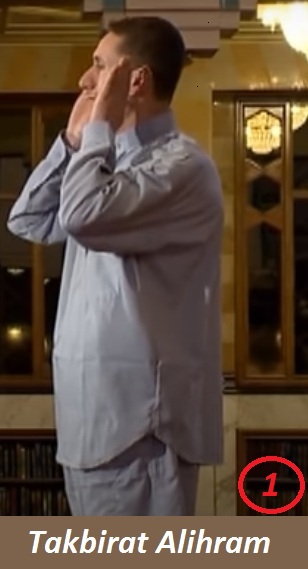
He then performs the
Takbirat Al-Ihram: saying Allahu Akbar (Allah is great).
 Then,
Then, he recites
Surat Al-Fatiha:
Bism illaahi r-Rahmaani r-Raheem: (In the name of Allah, the Beneficent, the Merciful).
Alhamdu lillaahi Rabbil 'aalameen: (Praise be to Allah, Lord of the Worlds).
Ar-Rahmaani r-Raheem: (The Beneficent, the Merciful).
Maaliki Yawmid-Deen: (Master of the Day of Judgment).
Iyyaaka na'budu wa iyyaaka nasta'een: (You [alone] we worship; You [alone] we ask for help).
Ihdina s-Siraatal-Mustaqeem: (Guide us to the straight path)
Siraatal-lazeena an'amta 'alaihim; Ghayril-maghdoobi 'alaihim wala d-daaalleen: (The path of those whom You have favored; Not the (path) of those who earn Your anger nor of those who go astray).
Then, he recites a full Surah or a part of it like Surat Al-Asr:
Bism illaahi r-Rahmaani r-Raheem :(In the name of Allah, the Beneficent, the Merciful)
Wal' asr: (I swear by the time)
Innal insaana lafee khusr: (Most surely man is in loss)
Illa llazeena amanu wa 'amilu saalihaati watawasaw bilhaqqi watawasaw bissabr: (Except those who believe and do good, and enjoin on each other truth, and enjoin on each other patience)
Then, he says :Allahu Akbar (Allah is great) .
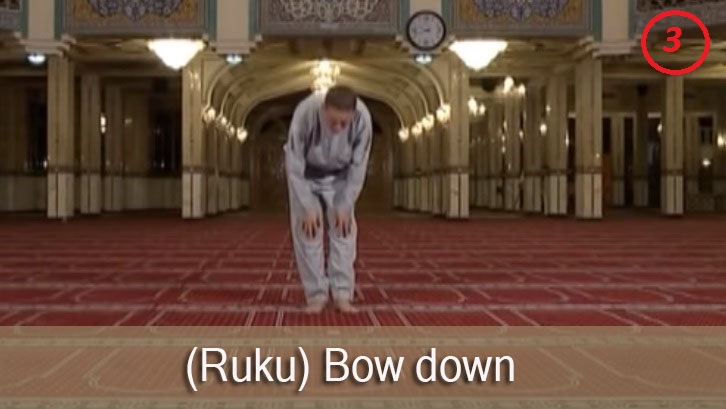
He then goes to
Ruku (Bow down), and says:
Subhana Rabbiyal-Atheem wa Behamdeh (Glory be to my High Sustainer and I praise Him), Allahumma salli ‘ala Muhammad wa Alli Muhammad. (O Allah! Send Your blessings on Muhammad and his Household).
While standing up he says Sami’aa Allahu Le-man Hamidah, Allahu Akbar (Allah hears and accepts the praise of one who praises).
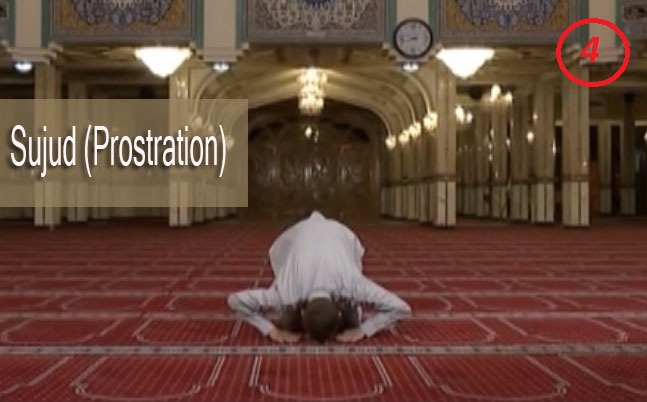 Then,
Then, he goes to
Sujud (Prostration) and says:
Subhana Rabbiyal-A’alaa wa Behamdeh. Allahumma salli ‘ala Muhammad wa Alli Muhammad. (Glory be to my Great Sustainer, Most High, and I praise Him. O Allah! Send Your blessings on Muhammad and his Household).
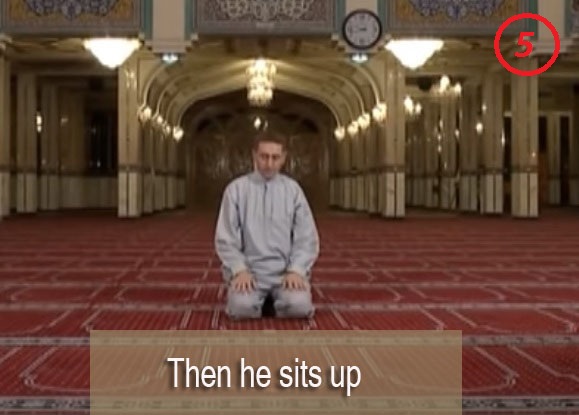 Then,
Then, he sits up, and says:
Allahu Akbar. Astaghfuru Allah, wa Atoubu ilaihi. Allahu Akbar (Allah is Great I seek forgiveness from Allah Who is my Sustainer, and I turn to Him. Allah is Great ).
Then, he goes down to the second Sujud (Prostration) and says: Subhana Rabbiyal-A’alaa wa Behamdeh.(Glory be to my Great Sustainer, Most High, and I praise Him); Allahumma salli ‘ala Muhammad wa Alli Muhammad (O Allah! Send Your blessings on Muhammad and his Household).
Then, he stands up, and It is recommended to say Allahu Akbar (Allah is Great)
By this, the first Riqaah (An individual unit of salaah) ends.
In the second Riqaah, he does the same thing.
He recites Surat Al-Fatiha, followed by another Surah or parts of a Surah.
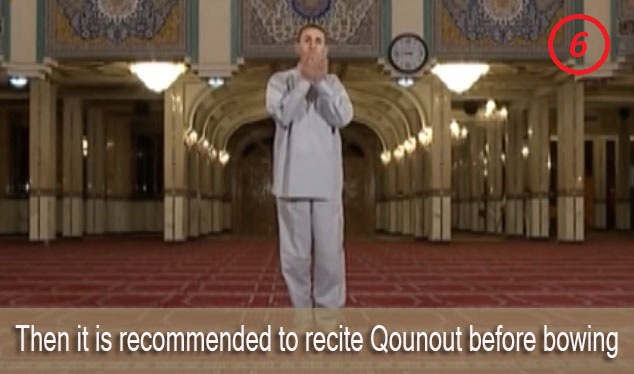 Then,
Then, it is recommended to recite
Qounout before bowing and say, as an examle:
Allahumma salli ‘ala Muhammad wa Alli Muhammad. Rabana Atina fi Dunia Hasana wa fi Akhirati Hasana Waqina Azaba Annar (Our Lord, grant us the good of this world and that of the Hereafter and save us from the torture of hell..) Wa adkhilna Al-Janna, Birahmatika Ya Arhama Rahimeen. (and let us enter heaven by Your Mercy. O Most Merciful)Sala allahu ala Sayyedina Muhammad wa ala Allihi Ataibiena Atahireen (O Allah! Send Your blessings on Muhammad and his Household). Allahu Akbar (Allah is Great)
Then, he performs Ruku and Sujud.
After the second Sujud, he performs Tashahud which is an important part of the prayer. He says:
Ashhadu an la illaha illa Allah Wahdahu la Sharika lah, (I testify that there is no god except the Almighty Allah, Who is One and has no partner) Wa Ashhadu anna Muhammadan 'abduhu wa Rasuluh (And I testify that Muhammad is His servant and messenger).
Allahumma salli 'ala Muhammadin wa Ali Muhammad. (O Allah! Send Your blessings on Muhammad and his Household).
Wataqqabal shafa'atahu warfa' darajatahu (And accept his intercession, and raise his rank).
Then, he stands up and it is recommended to say while he is standing: Bihawli llahi Aqoumu wa Akaoud.(I stand and sit with the help and strength of Allah).
In the third Riqaah, he recites Atassbihaat as follows:
Subhana Allah, Walhamdu Lillah waIla illaha illa Allah wa Allahu Akbar (Glory be to Allah, gratitude goes to Allah, there is no god except Allah, and Allah is Great) [it is recommended to repeat them three times inaudibly].
Then, he performs Ruku and Sujud, and stands up for the fourth Riqaah.
He recites the Tassbihaat, then he performs Ruku and Sujud which would be followed by Tashahud and Tasleem as follows:
Al Hamdulillah, Ash'hadu an la ilaha illa Allah wahdahu la sharika lah (All praise is for Allah, and I testify that there is none worth worshipping except the Almighty Allah, Who is One and has no partner).
Wa Ashhadu anna Muhammadan 'abduhu wa Rasuluh (And I testify that Muhammad is His servant and messenger).
Allahumma salli 'ala Muhammadin wa Alli Muhammad. (O Allah! Send Your blessings on Muhammad and his Household).
Assalamu 'alayka ayyuha n-Nabiyyu wa rahmatu ellahi wa barakatuh, (O Prophet! Allah's peace, blessings and grace be upon you!) Assalamu 'alayna wa 'ala 'ibadihi s-salihin, (Allah's peace be on us, those offering prayers - and upon all pious servants of Allah)Assalamu 'alaykum wa rahmatu ellahi wa barakatuh (Allah's peace, blessings and grace be on you believers).
With this, the prayer ends and it is recommended to add: Allahu Akbar, Allahu Akbar, Allahu Akbar.
Lastly, the Rikaas count of the five daily prayers is in three categories:
1- Subh: composed of two Riqaats.
2- Duhr, Asr and Isha: composed of four Riqaats each.
3 – Maghrib: composed of three Riqaats. It is the same as this prayer, but the Tashahud and Tasleem are recited after the third Riqaah.
Important remarks:
- In the two Adduhr prayers, the Fatiha and the Surah are recited inaudibly. In Subh and the two Isha prayers the man recites them audibly, while the woman can choose to recite audibly or inaudibly.
- As for the Tassbihat in the third and fourth Riqaats, they are recited inaudibly.
-The texts in blue are recommended.
-In prayer, the recitations and the Azkar/ Tasbihat should be made in Arabic and pronounced in the standard and correct way according to Urf (norms).
Non-Arabic Speaking Muslims should lean to learn to read Arabic correctly. Nevertheless, it is enough for one who is unable to do that to pronounce the words as good as he can. It is more likely for him to pray behind an Imam, although this is not mandatory.